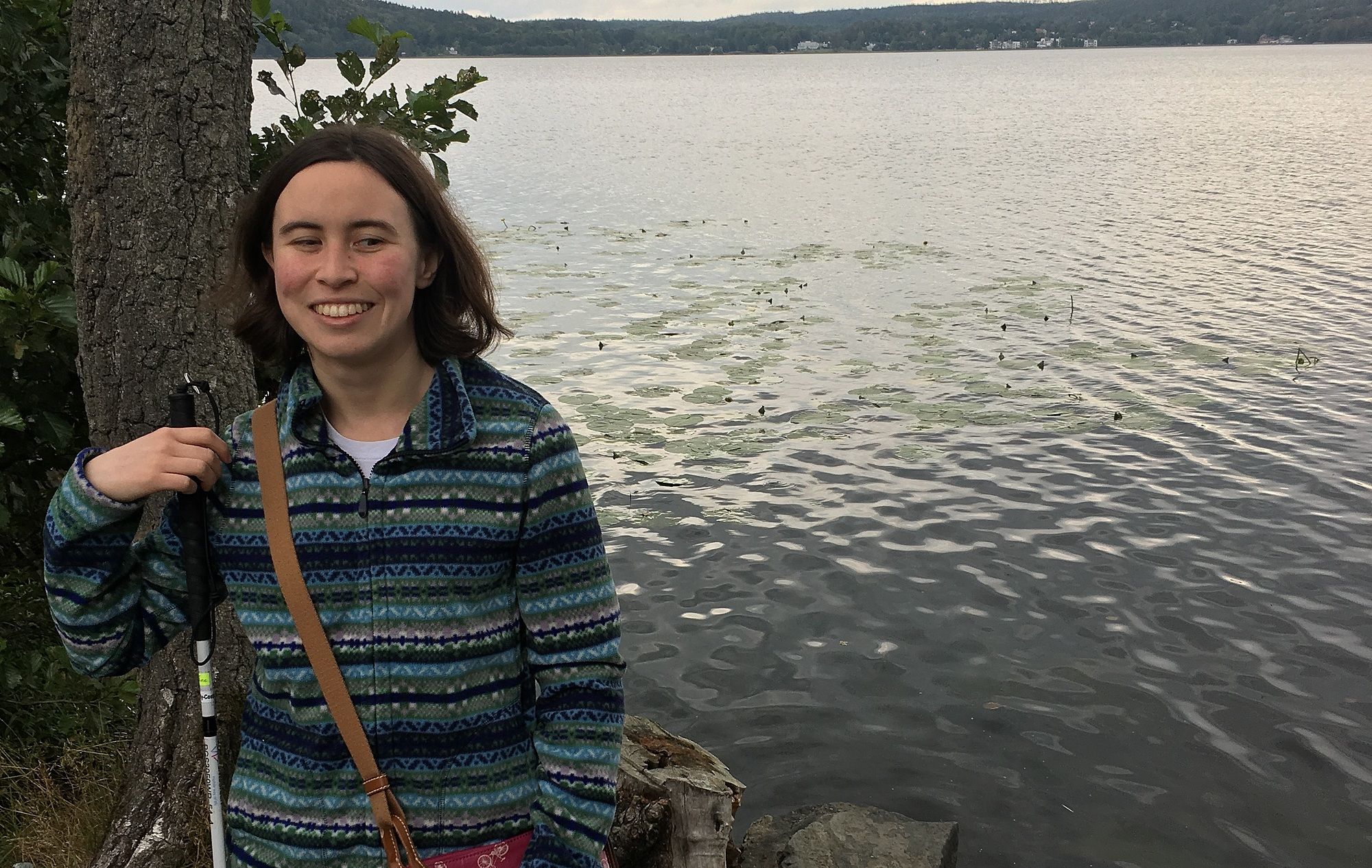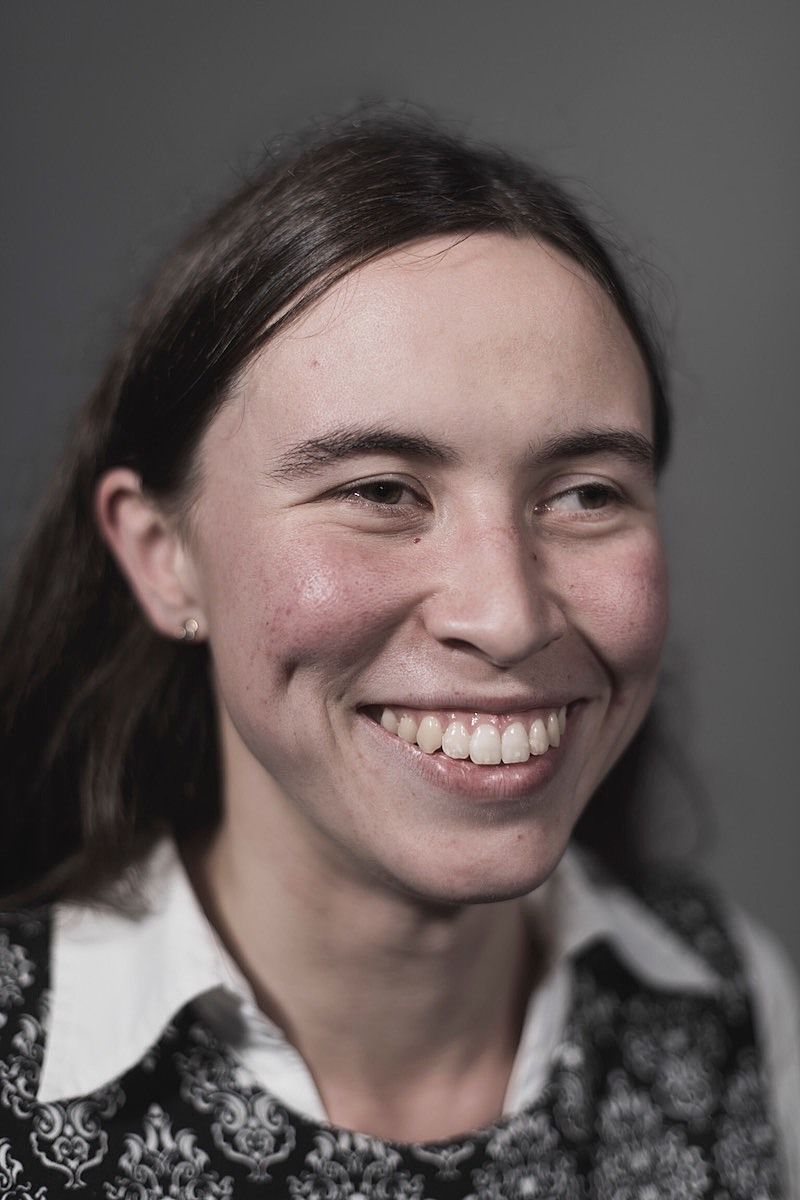Light Switches, Secrets and Single Stories: Growing Up Blind
As a kid, Áine knew that being blind was harder but never worse than being sighted. She wants to pass that knowledge on, but resists being a ‘blind kid success story’.
As a kid, Áine knew that being blind was harder but never worse than being sighted. She wants to pass that knowledge on, but resists being a ‘blind kid success story’.
I'm sitting in my pyjamas and favourite fleece in front of the computer in my student apartment in Gothenburg, Sweden. It’s February and, though the sun has made some erratic appearances this week, shades of less dark, dark and darkest are still normal. The low light reminds me to take my vitamin D supplements. This winter, for the first time in my life, I’ve taken to turning on the electric light in my room. I’m pretty sure it helps my sleep cycle and, besides, I can see just enough light to remind me that Sweden really is much darker in winter than New Zealand, where I mainly grew up.
*
I was born in Ireland in 1995. Some narcissistic part of me loved hearing and play-acting the story of my birth, awed by the notion that a little human such as me could genuinely grow inside a bigger human, such as Mummy. Naturally, the arrival of my younger brother, when I was four, was a momentous occasion. I remember the privilege and wonder I felt holding his days-old body for the first time. Mum was always telling me she wanted me to have a sibling. Whether the new family member would be able to see or not was immaterial.
My brother was sighted, as it turns out, and a few years later my biologist parents would deliver that Punnett square genetics lesson that normally turns up in intermediate school. They explained that the version I had of my eye condition, Leber’s Congenital Amaurosis, or LCA, was recessive, meaning other kids that Mum and Dad had would have a 50 percent chance of carrying it and a 25 percent chance of it actually showing up. I considered these details to be scientifically interesting factoids, probably stored in the same region of my brain that retained that over-simplified piece of trivia about humans sharing almost half their genes with bananas.
*
In my memory, I’m two. I’m standing in the kitchen with a pottle of yoghurt, probably strawberry, in hand. I have one clear mission: I need Mummy to give me a spoon so I can eat my yoghurt – now. “‘Poon!” I say. I'm not managing the ‘sp’ sound at the beginning of the word, and Mummy really wants me to say it properly. “‘Poon! A ‘poon!” I repeat, in vain. I know she knows what I want, so why won't she give it to me? A decade later, Mum would apologise and explain that she had worried I might have a speech impairment, perhaps connected to my blindness.
“Mummy,” I enquire, “is it better to be able to see?” “It's not better,” she explains, “but it is easier.”
That memory stuck, but it was an exception. As I grew up, Mum encouraged me to explore activities I was interested in, which was generous because I had an abundant supply of interests: from piano to horse-riding to speedskating to tap dancing. She prioritised tracking down useful tools for raising a blind child, ensuring I wouldn't be burdened with any fears she had about the impact blindness would have in my life. I didn't know, for instance, about the pre-Google challenges she encountered in working out how best to prepare me for learning Braille, or that she made an effort when I was very little to narrate what she was doing around the house so that I'd learn to associate daily sounds and actions with language, and develop more spatial awareness. In 2001, when we were living in Canada, she arranged a family weekend for blind kids and parents across three geographically vast provinces, most of whom had never met a single other family with blind children before.
Mum didn’t divulge one significant factor in our family fortunes until 10 years after the fact. In early 2008, our family came within weeks of being forced to leave New Zealand, then our home of almost four years, because of discriminatory immigration policy provisions that placed high weighting on the financial cost I was deemed to impose on New Zealand's education system by being blind. I sat transfixed at the dinner table the evening she told me, staring into a parallel universe. I'm forever thankful I didn't enter that universe when I was 12.
*
Over the last few years, I've been both a journalist and a community organiser for campaigns. I am regularly entrusted with other people's information and stories, and sometimes I entrust other people with my own. It's a privilege and a responsibility, this sharing business. But what about the stories and experiences we implicitly must entrust to those we are closest to? Mum has had input into the way I have represented her experiences in this piece because our family stories and interactions are not mine alone to share.
The last thing I want to become is a yardstick for measuring the ‘success’ of other blind kids and teens.
I know that LCA ListServ, Facebook groups, blogs and so on are a blessing for many parents. A medical professional telling you your child is blind and diagnosing them with a condition you’ve never heard of is surely a scary moment, particularly if supplemented only by medical analysis rather than tools for raising a blind infant. But those online outlets also raise complex questions around privacy. In publicly available forums, will parents always maintain the wherewithal to only publish information an older version of their child could read without the heart-wrenching shock of discovering they didn't always live up to their parent's expectations or hopes? What if, for instance, a nine-year-old child discovers that their parent, according to information they have found online, hopes above all that they will be able to see one day? Maybe that child is not at all sure whether they would, in fact, like to be given sight. What if not knowing the answer to that question was perfectly inconsequential until half an hour ago, before they saw that Facebook thread or that blog post?
*
In Mum's memory, I am seven and we are driving home from a piano lesson when I put her to the test. "Mummy," I enquire, "is it better to be able to see?" "It's not better," she explains, "but it is easier." I imagine seven-year-old me agreed. Twenty-four-year-old me certainly does, all else being equal.
Easier when joining my local sports club, which at first wouldn't take me because I was blind. Easier when auditioning for my school production – the teachers directing it argued there was no suitable part for me specifically because I was blind. Easier when organising the logistics of moving to a foreign city to study, or needing to memorise my part to play in an orchestra, or sussing accessibility logistics to work as a digital journalist. Easier, indeed, but not better.
In 2018, designer Liz Jackson wrote an opinion piece in The New York Times entitled ‘We [disabled people] are the Original Lifehackers’. That’s bang on.
*
It’s 2014 and we’ve been living in New Zealand for a decade now. I’m home from university and Mum reminds me about something I’ve been procrastinating. She’s been at me to invite myself to speak at the family conference for LCA, which is mainly aimed at parents. It’s thousands of kilometres away, in Massachusetts, USA, but we can make it part of a family holiday, she assures me. She tells me that when I was little, having young adults with LCA speak at these conferences did wonders in helping her envision me growing up in a happy, healthy way. That’s a vote for valuing lived experience of a parent, if ever there was one. I eventually send off the dreaded enquiry – and speak at the conference. I’m grateful to the parents who told me afterwards how much they valued that session.
*
Chimamanda Ngozi Adichie has this great TED Talk about the danger of a single story. Internalising a single story, she says, bolsters stereotypes until those stereotypes become the only story.
I don’t know if I would ever want to get used to using light, really using it, if the option of gaining some sight was offered to me.
When weighing up whether to speak about my life in disability-related contexts, I constantly fear that my story may be unwittingly interpreted as a single story. If my playing flute in an orchestra, or living abroad, or swimming competitively, or being a journalist encourages parents to embrace letting their kids pursue their interests, then I should speak. But the last thing I want to become is a yardstick for measuring the ‘success’ of other blind kids and teens.
*
Written reflections help me connect across time and space. They have opened up conversations with my own parents and they invite other parents in. They ground me in the towns and cities that have nurtured me, and let me share perceptions and experiences across internet servers and oceans.
It’s now almost midnight here in Gothenburg. I walk two metres to my light switch to flick it off. I don’t know if I would ever want to get used to using light, really using it, if the option of gaining some sight was offered to me. I'm glad treatment research is ongoing, for those interested in it. I'm even more relieved that right now, in my one-room student kingdom, I can put that question to sleep and focus instead on finding some chocolate to nibble on, begrudgingly shutting down my computer, and remembering that tomorrow is one day closer to summer.

